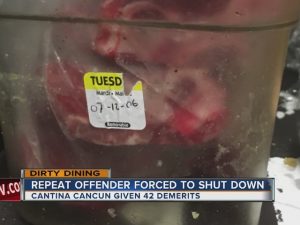Alejandro Barahona and Ken Alltucker of AZ Central report a Phoenix resident filed a lawsuit against Texas-based Pappas Restaurants Inc. that claims she contracted salmonella last month after eating at the chain’s Phoenix restaurant.
 The Maricopa County Department of Public Health confirmed there was an investigation of a salmonella outbreak at Pappadeaux Seafood Kitchen of Phoenix.
The Maricopa County Department of Public Health confirmed there was an investigation of a salmonella outbreak at Pappadeaux Seafood Kitchen of Phoenix.
The outbreak is over and the county health department is closing its investigation, said Jeanene Fowler, a department spokeswoman.
Because final paperwork that details the outbreak has not been completed, Fowler said, county officials could not confirm the number of people who became ill after eating at the popular seafood restaurant, at 11051 N. Black Canyon Highway.
A manager at Pappadeaux in Phoenix said he could not discuss the outbreak, referring Republic inquiries to the chain’s headquarters in Houston. Officials at the chain’s headquarters did not respond to phone messages and email questions about the county’s investigation or the lawsuit.
Pappas Restaurants has not yet answered the lawsuit, which was filed last Friday at U.S. District Court in Phoenix.
The lawsuit states that on Aug. 14, Phoenix resident Shaina Robinson ate shrimp, tilapia and crab cakes at Pappadeaux Seafood Kitchen of Phoenix. The lawsuit states that two days later, Robinson became “violently ill” with stomach illness. Four days later, she sought treatment at a Scottsdale hospital.
She spent five days at the hospital and tested positive for a strain of salmonella, according to the lawsuit.
She missed two weeks of work and “incurred significant medical bills as a direct and proximate cause of her salmonella infection contracted at Pappadeaux Seafood Resturant,” the lawsuit states.
Robinson is seeking restitution for irreparable emotional distress, medical expenses, bodily injuries, suffering and permanent impairment, among other claims.
The county health department often does not publicly announce restaurants tied to an outbreak unless officials believe it can help prevent people from becoming sick, Fowler said.
 She said part of the issue is timing. County health and environmental services inspectors must confirm that an outbreak is ongoing and public disclosure could prevent people from getting sick. Inspectors also must verify an outbreak is tied to a specific restaurant and not a supplier that delivered tainted food to different establishments.
She said part of the issue is timing. County health and environmental services inspectors must confirm that an outbreak is ongoing and public disclosure could prevent people from getting sick. Inspectors also must verify an outbreak is tied to a specific restaurant and not a supplier that delivered tainted food to different establishments.
“We don’t wanted to put (restaurants) out of business for something that may have nothing to do with the business,” Fowler said. “We are trying to take that into account.”
But Fowler said that completed reports, whether it’s a routine inspection or investigation of a foodborne illness, are available for public inspection.
“We get hundreds and hundreds of these each year,” Fowler said, referring to foodborne-illness complaints.
Attorney Ryan Osterholm said he believes county health officials should aggressively notify the public during outbreaks.
“The public deserves to know,” Osterholm said. “There should be transparency in anything unless there is a compelling reason not to. … The baseline should be transparency.”
 Bosses confirmed the restaurant was closed for a “short period” after evidence of mice was discovered at the fast food joint.
Bosses confirmed the restaurant was closed for a “short period” after evidence of mice was discovered at the fast food joint.













